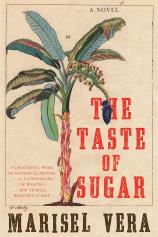The Taste of Sugar
Review
The Taste of Sugar
Marisel Vera shines a light on a little-known aspect of U.S. history in THE TASTE OF SUGAR. At the turn of the 20th century, thousands of people from the recently acquired territory of Puerto Rico traveled halfway around the world to work on sugarcane plantations in Hawaii. Vera’s moving novel --- her second after IF I BRING YOU ROSES --- explores the forces that led one family to leave their beloved homeland and seek out a new start in an unfamiliar and unwelcoming land.
To understand why Vicente Vega, his wife Valentina and Vicente’s half-brother Raulito make the arduous journey to Hawaii, Vera (who is of Puerto Rican heritage) first turns the clock back to the mid-19th century, when the Spanish still ruled over the Caribbean island. Slavery remains legal (it would not end until 1873), and extreme poverty is endemic. Even after abolition, many on the island are no better than serfs, living “la vida de perro.” (Spanish is interwoven throughout the text.) In contrast, Vicente’s grandfather is a moderately well-off owner of a coffee plantation in the mountainous region of Utuado. But the family’s fortunes decline over the years. By the time Vicente grows to manhood, they are humble farmers, though they are better off than the peones who “are lucky if they eat once a day.”
"Vera’s well-researched book is a valuable lesson in Puerto Rican history and an eye-opening glimpse at the ugly reality behind the U.S.’s often overlooked history as a colonial power."
On a trip to Ponce to attend a wealthy cousin’s wedding, Vicente meets the lovely young Valentina. The smitten girl “wishing for romance and adventure” gives up her romantic dreams of Paris to marry Vicente, not realizing that being “a proper ama de casa” on the farm is nothing like being a housewife in Ponce. Still, she vows to “devote herself to her family and put away all childish dreams,” as she writes in a letter to her sister Elena after her marriage. Their life, though hard, is not without its joys. Things change when the U.S. ousts the Spanish in 1898. When Hurricane Ciríaco hits a year later, the disaster is immense. The inadequate American approach to handling the crisis is depressingly similar to the bungled response to Hurricane Maria more than a century later.
Vicente, Valentina and Raulito make a wrenching decision to leave Puerto Rico behind and seek a better life elsewhere. But the Hawaiian Sugar Planters’ Association’s promises to the puertorriqueños prove empty. Instead of decent homes, they live in cheap, cramped shanties. Wages are paid in scrip instead of cash. The schools they were told their children could attend don’t exist. It’s a familiar yet devastating story of exploitation, as the Puerto Ricans discover they’ve traded one bleak situation for another that’s somehow even worse, where even the small comforts of home have been stripped away.
Vera’s well-researched book is a valuable lesson in Puerto Rican history and an eye-opening glimpse at the ugly reality behind the U.S.’s often overlooked history as a colonial power. This tale interrogates the surprising connections between two outposts of the country’s imperial empire. Hawaii’s own complex history of colonization isn’t explored in the same detailed way as is Puerto Rico’s, but we get a sense of the disparate forces at work in the Polynesian archipelago. Workers like Valentina and Vicente live in shacks once occupied by Portuguese sugarcane workers and work alongside Japanese immigrants, whom they view with suspicion. Who is really in charge in the territory is clear in a brief scene that occurs after Raulito is sentenced to three years of hard labor for a minor crime. The sheriff pours the judge in the case a class of pineapple juice “sent to him specially by his pal Dole, the owner of the biggest pineapple plantation in all of Hawaii.”
But Vera delivers a more than necessary corrective to history. The book is also the story of a young woman’s loss of innocence, as Valentina slowly sheds her girlish naivete, and a succession of tragedies and hardships sharpen her into a harder, less sentimental person. And there is a real and heartbreaking sense of loss among the immigrants when they arrive in Hawaii. “I miss Puerto Rico and Ponce…and even the mountain in Utuado,” Valentina writes in a letter to her sister, whom she has not seen since she was married. Raulito laments that he will “never hear coquís again” before telling himself that “it was ridiculous to cry over frogs.”
Vivid details help the story come alive. Vicente charms Valentina when he tells her that her “eyes shine like roasted coffee beans.” After the hurricane, he observes that the storm “had picked up the coffee trees and shaken them like maracas.” But in the grand sweep of history, some smaller dramas are swept away. A long-simmering tension between Vicente’s lecherous father Raul and Valentina threatens to cause trouble in the couple’s marriage, but ultimately the conflict comes to nothing. Toward the novel’s end, Vera seems to run out of steam, and the story concludes in an abrupt, not altogether satisfying way. But as a vibrant portrait of a family struggling to survive against the odds, THE TASTE OF SUGAR never fails to fascinate.
Reviewed by Megan Elliott on June 19, 2020
The Taste of Sugar
- Publication Date: July 6, 2021
- Genres: Fiction, Historical Fiction
- Paperback: 400 pages
- Publisher: Liveright
- ISBN-10: 1631499041
- ISBN-13: 9781631499043



